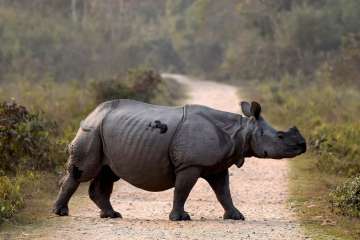BBC in soup for documentary on killing of Kaziranga poachers, faces govt blacklist
The Environment ministry, calling its reportage “grossly erroneous”, has recommended the blacklisting of its South Asia correspondent Justin Rowlatt.

A documentary by the BBC highlighting the government’s “ruthless anti-poaching strategy” for the Kaziranga tiger reserve has landed the network in trouble.
The Environment ministry, calling its reportage “grossly erroneous”, has recommended the blacklisting of its South Asia correspondent Justin Rowlatt, a report in The Indian Express said today.
The BBC documentary titled ‘Killing For Conservation’, explores what it calls the “dark secrets” of Kaziranga and examines if its war on poaching has gone too far. It claims that forest guards have been given powers “to shoot and kill”.
The film concludes that the forest guards killed more men than poachers killed rhinos. As per the film, 23 people lost their lives compared to just 17 rhinos last year. In a BBC article introducing the film, Rowlatt also claimed that only two intruders were prosecuted while 50 were shot dead since 2014.
According to The Indian Express, the National Tiger Conservation Authority (NTCA), in a notice issued yesterday, faulted Rowlatt and the BBC for airing the programme last Saturday without submitting it to the Ministries of Environment and External Affairs for the mandatory preview necessary to what it calls “remove any deviations, so as to achieve a balanced and accurate exposition of the theme.”
The MoEF claims that the documentary “shall provide a fillip to wildlife offences, especially poaching.”
The NTCA asked Rowlatt and BBC’s South Asia bureau to show cause within seven days as to why their filming permissions should not be revoked. It warned the broadcaster of cancelling all future permits if the programme was not removed from various online portals immediately. The Indian High Commission in the UK has also been asked to take action, the report added.
In its notice, the NTCA claimed that the BBC submitted a very different storyline while seeking permission for filming: “Story on challenges and expertise of India’s conservation drive. We would like to report on and feature what we consider the most exciting aspect of conservation in India — the elite rangers of Kaziranga as they go on night patrol and show our viewers the efforts being taken to protect wildlife in India.”
Instead, the notice said, “the producer has used spasmodic events as an umbrella to judge a gamut of conservation efforts that go into safeguarding our wildlife heritage, with scant understanding of the laws in place. The immunity provided to forest officials under Section 197 of the CrPC has been construed as a ‘Shoot to Kill’ policy.”
The BBC, however, has defended its stand saying the issues raised in the film were part of an important international debate on the appropriate way to combat poaching.
“This film makes clear the successes achieved by India’s conservation policies in preserving the country’s most iconic wildlife. However, the film also expressly set out to explore the challenges of India’s conservation drive and during production it became clear that one of those challenges was the impact on communities living next to the park. Our audiences expect us to bring them the full picture, while adhering to our editorial standards and this piece is no different. The issues raised in the film are part of an important international debate on the appropriate way to combat poaching. We did approach the relevant government authorities to make sure their position was fully reflected but they declined to take part,” The Indian Express quoted an emailed response by the BBC as saying.